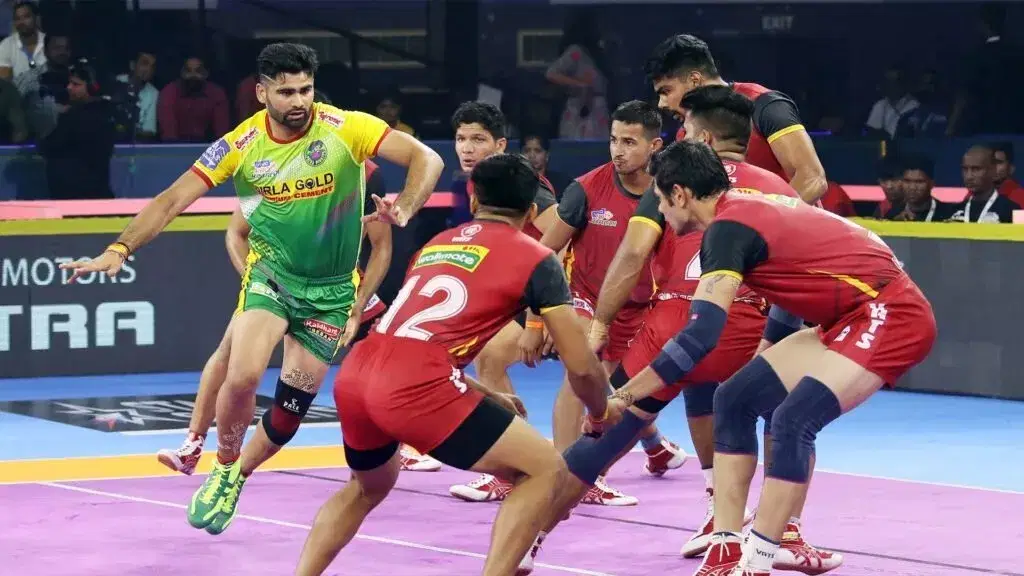Has PKL succeeded in its mission to put Kabaddi on world map?

(Courtesy : Pro Kabaddi League)
The eighth edition of the tournament will begin in December.
Confusion was brewing on the gates of the National Sports Club of India in Mumbai, as a new league was taking its first steps on July 26, 2014. Thousands of people were waiting for the gates to be opened. They had arrived from various parts of the country to witness ‘India’s own game’. Only a handful of fans were sitting inside, and a couple more were on promotional seats. A few phone calls were all it took to get the gates opened. The show began with U Mumba taking on the Jaipur Pink Panthers in a Kabaddi match.
Kabaddi was always perceived as a rural game, not one to be attractive to urban audiences. However, since the launch of Pro Kabaddi League (PKL), it has made waves among the rural and urban viewers alike. It is the second-most viewed sports league in India, following the Indian Premier League.
The journey of the sport
As a game, Kabaddi finds its origins in ancient India and arguably, Iran. Texts suggest Lord Krishna played the game and it also finds mention in Mahabharata. Some historians suggest that its roots lie in the Vedic period, while some trace it back to Sistan, a place in present-day Iran. It is often used as a recreation sport as well as to gain strength by means of combat. It is played in four forms across India – Amar, Suranjeevi, Huttuttoo and Gaminee. Suranjeevi is the most-widely accepted form and is used on the international podium.
The sport was first demonstrated on the global stage at the 1936 Berlin Olympics by Maharashtra’s Hanuman Vyayam Prasarak Mandal, leaving Adolf Hilter in awe of the sport and its benefits. Mahatma Gandhi also wrote an article on the same. However, it went into an abyss, not to return until the 1980s.
Kabaddi made a mark at a global event in 1982 as an exhibition sport at the Asian Games in Delhi. It became a full-fledged sport at the Asian Games from 1990 onwards. Since then, India and Iran have been the perennial heavyweights, with the former winning the title nine times and the latter twice. Bangladesh, the nation with Kabaddi as its national game, has won three silver medals.
A World Cup for Kabaddi began in 2004, with three editions organized so far. India have hosted and won all three of them, witnessing participation from 12 teams from across the globe. Beyond Asian sides, Kenya and Poland are some of the countries evolving in the sport. Canada is also coming up as a formidable team.
The evolution of PKL

A league that started as an attempt to commercialize a rural sport has now found a dedicated following amongst millions while also inspiring not just Asia but countries beyond to take up the sport. African players are now increasing in number and are set to increase further as the league grows.
The PKL is the biggest private league in India for any sport, with 12 teams. It started off with eight, and has grown to 12. It has spread its wings throughout India, mixing the deep-rooted culture associated with the sport to a platform for the local players and global stars. The PKL became the second-most followed sport in India, right in its first season itself. It registered 435 million viewers in the first season, second only to the Indian Premier League in terms of viewership.
PKL's effect globally
With the advent of the league and the slow yet gradual influx of global stars, Kabaddi is set to be taken more seriously as a sport in newer pastures of land across the globe. The Olympics, for instance, requires 75 countries to play the sport across four continents. While the number of countries and continents have never been a question, the lack of national Kabaddi federations is a major hurdle, hampering the chances for the sport to be included in the Olympics.
With PKL, the sport has gone places. It has made its mark in several countries in the sub-continent, across Asia (Japan and South Korea have good teams) and new teams are growing by the day. This, however, will take more time than usual, given the physical nature of the sport and the lack of popularity in some parts of the world. The Indian league already plays a key role for the sport in Asia, and looks set to have a bigger impact in growth of the sport globally.
For more updates, follow Khel Now Kabaddi on Facebook, Twitter, Instagram and join our community on Telegram.
Where passion meets insight — blending breaking news, in-depth strategic analysis, viral moments, and jaw-dropping plays into powerful sports content designed to entertain, inform, and keep you connected to your favorite teams and athletes. Expect daily updates, expert commentary and coverage that never leaves a fan behind.